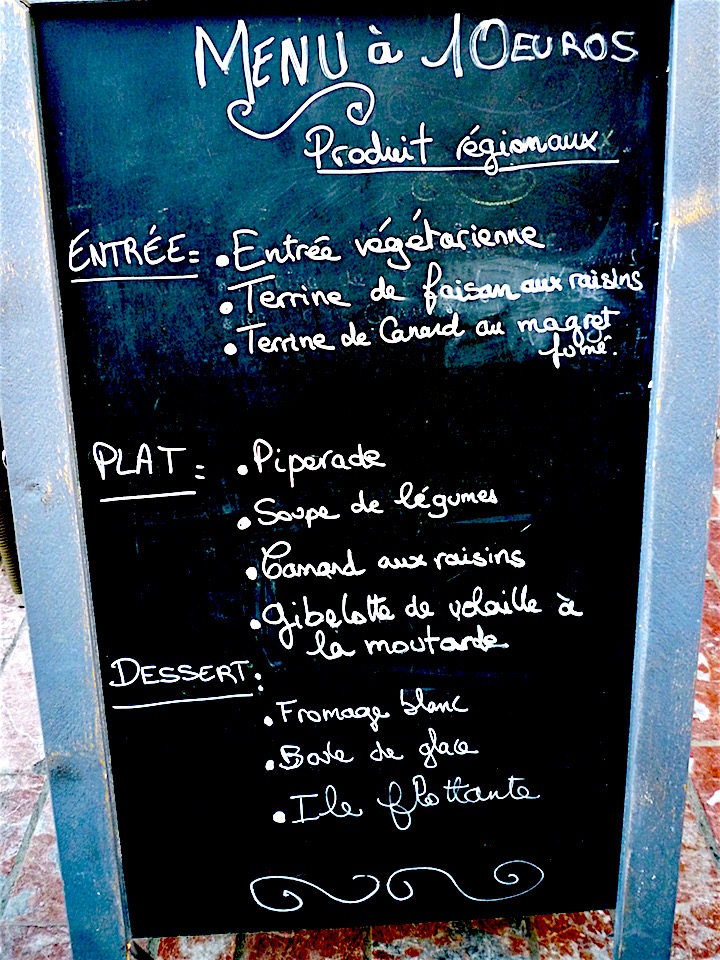 From what I’ve read, for some people even an IRS audit would be less stressful than ordering a meal from a French waiter.
From what I’ve read, for some people even an IRS audit would be less stressful than ordering a meal from a French waiter.
Yet one of the Top Things to Do While Traveling in France is eating. It doesn’t have to be stressful. Here’s how.
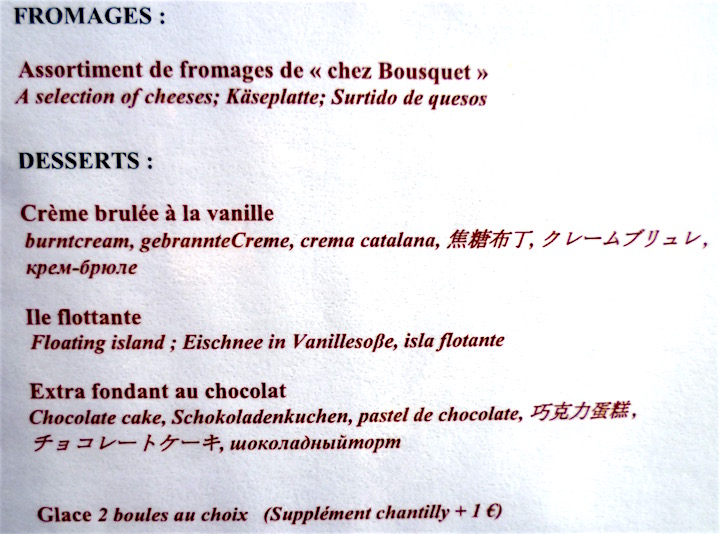 First of all, get the restaurant right. If you go to the big place right on the waterfront or whatever the main tourist draw of your destination is, then you can almost be sure that it isn’t going to be good, and the waiters aren’t going to care. This is true worldwide.
First of all, get the restaurant right. If you go to the big place right on the waterfront or whatever the main tourist draw of your destination is, then you can almost be sure that it isn’t going to be good, and the waiters aren’t going to care. This is true worldwide.
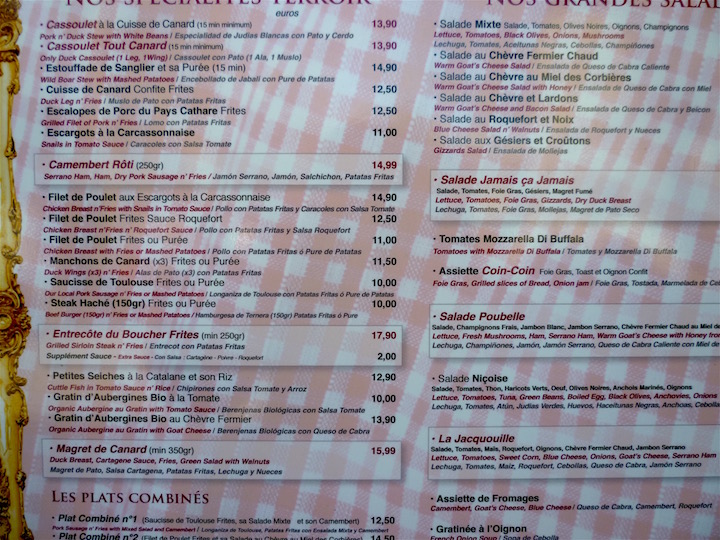 But if you’re in France, it’s doubly a crime, because France is a place where you can have absolutely heavenly food, from the finest of haute cuisine to humble yet delicious dives. Bad food is practically criminal here.
But if you’re in France, it’s doubly a crime, because France is a place where you can have absolutely heavenly food, from the finest of haute cuisine to humble yet delicious dives. Bad food is practically criminal here.
The French diner uses the power of the purse to punish restaurants for bad cooking, or to help them succeed for good cooking. That is, away from the most obvious tourist spots, where the restaurants don’t have to care about the French diner. In order to get the best of French cuisine, you have to eat where the French do.
Things to look for:
Multilingual menus–they are often a clue to a high level of tourist trade.
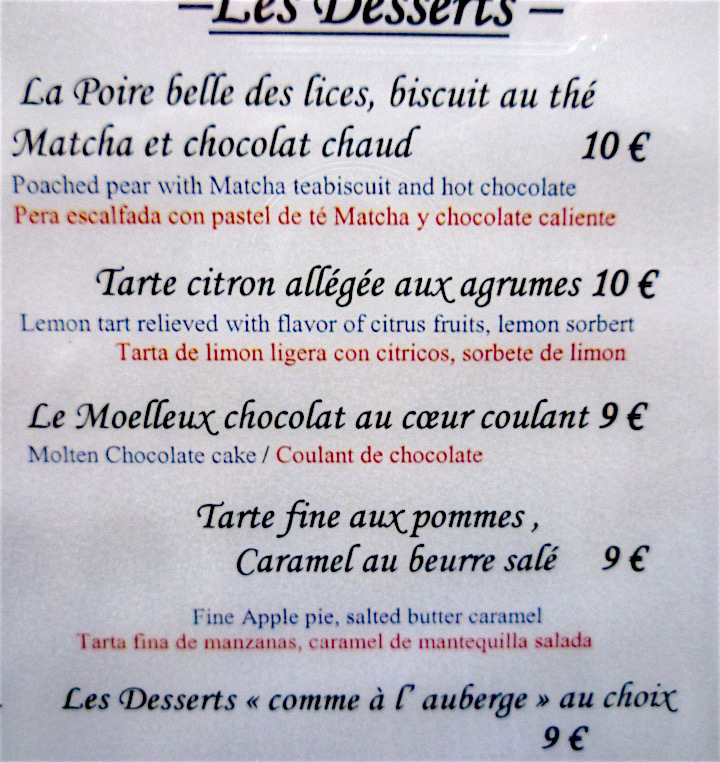
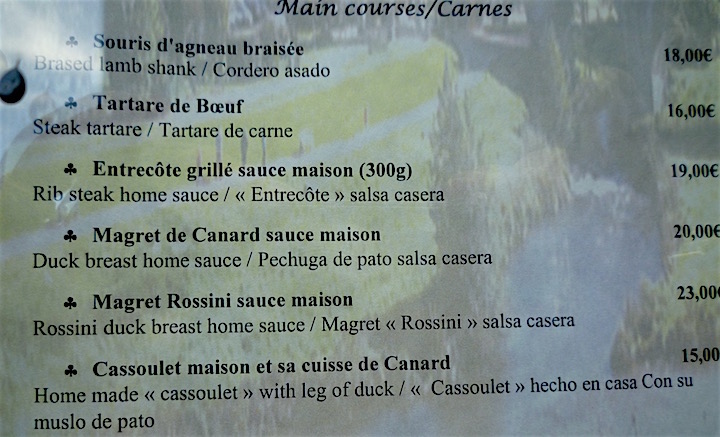
This is not a fail safe measure. Even for establishments without personal translators, it takes minimal effort to get the job done online. (Sometimes with comic results; however, bad translations don’t mean bad food–they mean bad translators.) So on the one hand, let’s give restaurants credit for being welcoming to tourists by providing translations, since it really shouldn’t be a big deal.
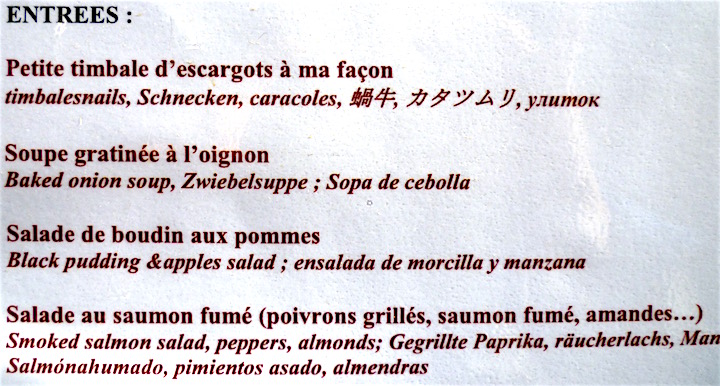
On the other hand, the tough judges aren’t the tourists but the locals. You want to eat where they do. And if a restaurant is good enough, it will have so much business with the locals that it won’t need the tourists. This is the ideal restaurant. Reservation cards on tables are one hint that a place is good. Locals don’t walk in; they reserve.
Let’s say you’re walking around, looking for a place to eat. How can you tell whether a restaurant will be satisfying? One tip: look for chalk.
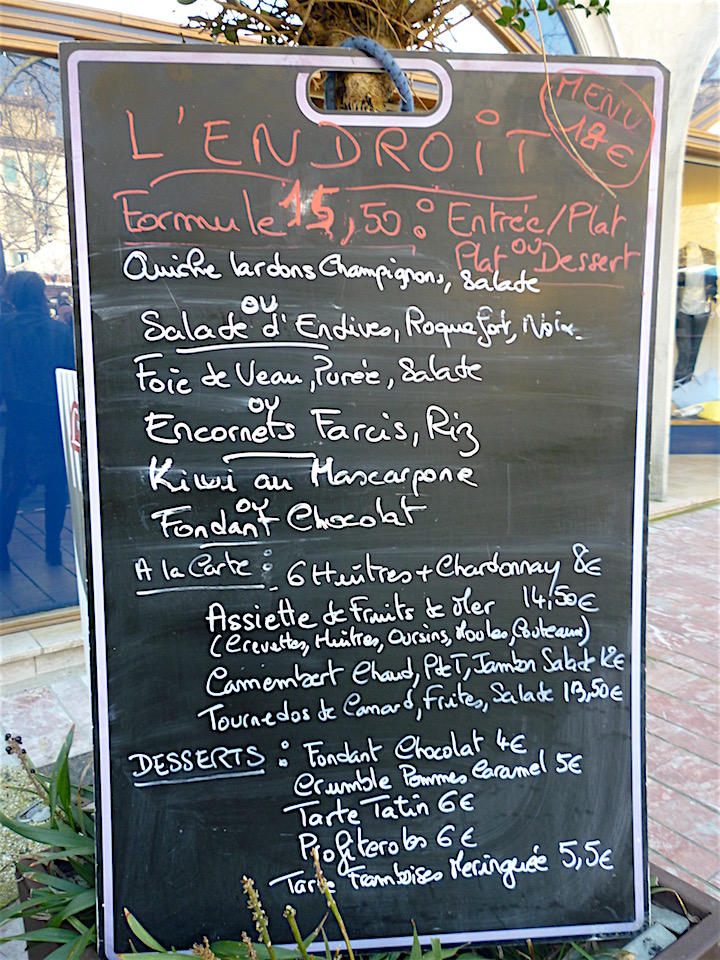 Pre-printed menus, like translations in many languages, aren’t a huge effort or expense anymore. But they can (as in sometimes) indicate that the menu doesn’t change with seasons. And that the menu is too big. There’s a risk they’re out of this and that, especially if you’re not traveling in high season, or you’re going to be served pre-cooked or industrial stuff, not freshly homemade.
Pre-printed menus, like translations in many languages, aren’t a huge effort or expense anymore. But they can (as in sometimes) indicate that the menu doesn’t change with seasons. And that the menu is too big. There’s a risk they’re out of this and that, especially if you’re not traveling in high season, or you’re going to be served pre-cooked or industrial stuff, not freshly homemade.
Instead, look for a chalkboard with the day’s menu written in chalk. That means it changes, possibly daily.
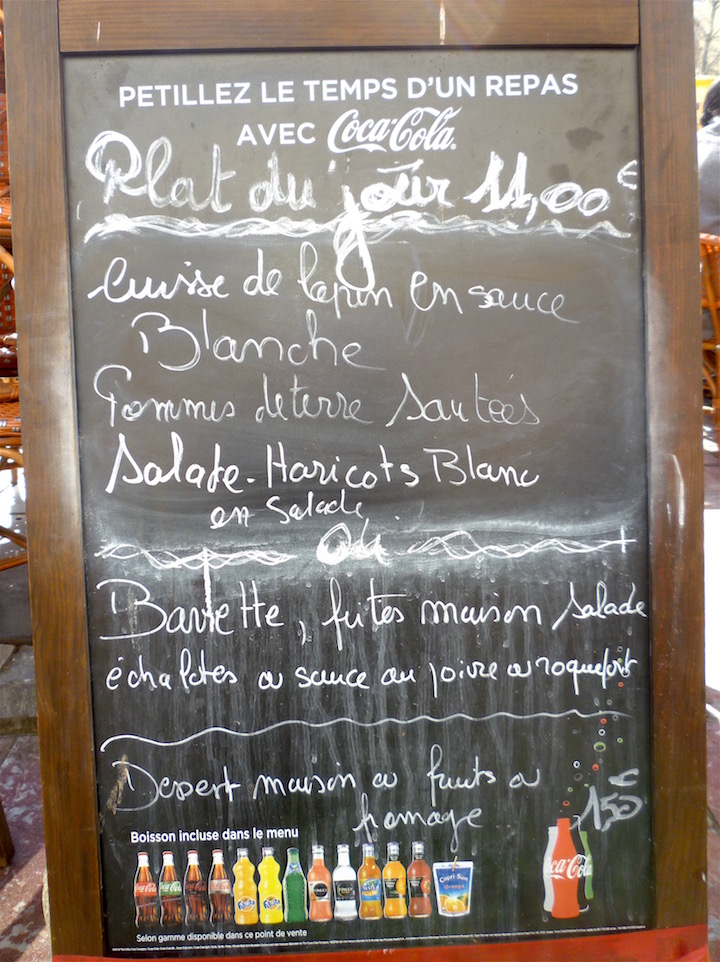
A small menu means the chef pays attention to each dish and each ingredient.
Another key to your dining satisfaction is to know that an entrée is a starter/appetizer (not the main course). Entrée means entry, after all. The main dish may be called a plat (plate, or dish) or else you’ll just see viandes/poissons (meats/fish) in a separate category. I have noticed more vegetarian choices lately, but that’s a new trend. Even salads tend to have meat. Salade gourmande usually includes foie gras, gizzards and slices of dried duck breast. Just so you know. Usually these kinds of big salads are considered a meal and aren’t in any “prix fixe” or set-price menu. A “salade composée” is just a lot of ingredients laid on a bed of lettuce, not tossed. The French are not big on tossing. They like each item to be distinct. Just so you aren’t surprised.
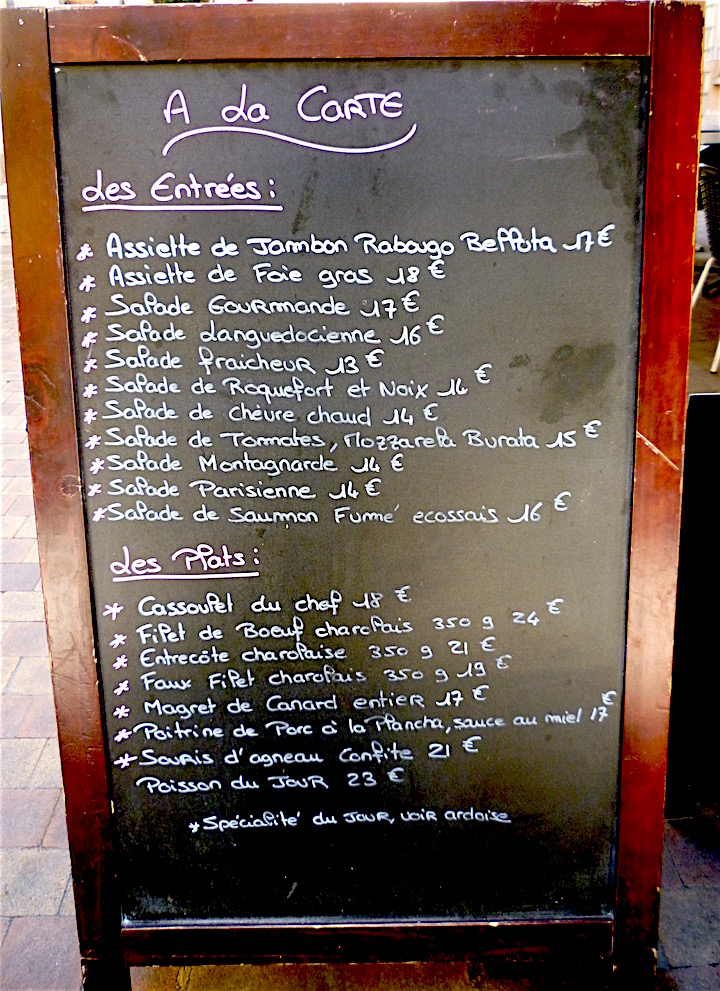
Often, the menu will have separate dishes in their separate categories–five or six starters, then five or six main courses–and then a variety of “menu” choices, where you can get a good deal. It might be choose among entrées, plats, desserts for one price. Or it could be entrée + plat or plat + dessert for one price, and entrée + plat + dessert for another price.
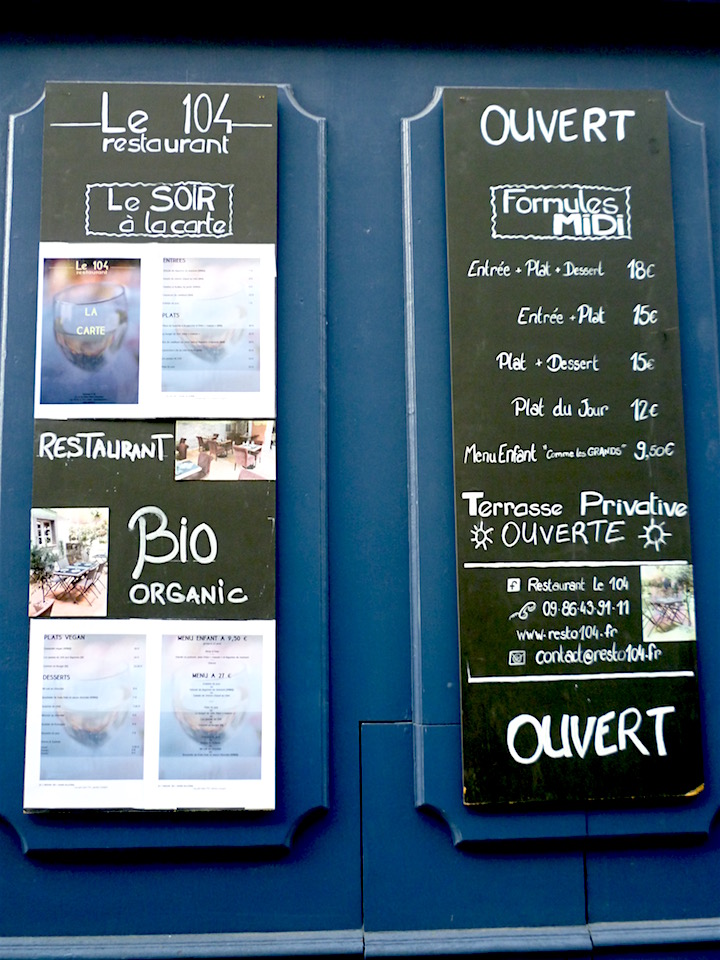 Cheese, at least a nice wedge or round with a bit of bread, usually is included in a menu. Sometimes also a small pitcher of wine, especially at lunch.
Cheese, at least a nice wedge or round with a bit of bread, usually is included in a menu. Sometimes also a small pitcher of wine, especially at lunch.
Seriously. This IS France!
On to the waiters. They are professionals. The tension is not really about them and their alleged rudeness but about diners’ expectations. What French diners expect from waiters is not at all what Americans expect.
The French waiter is not supposed to be your friend. He (and it very often is a man) is supposed to serve you. This is not rude; he’s supposed to leave you alone. He will not tell you his name; he may describe the day’s specials, but not to the extent that is fashionable in the U.S. He won’t stop by to see whether everything is OK.
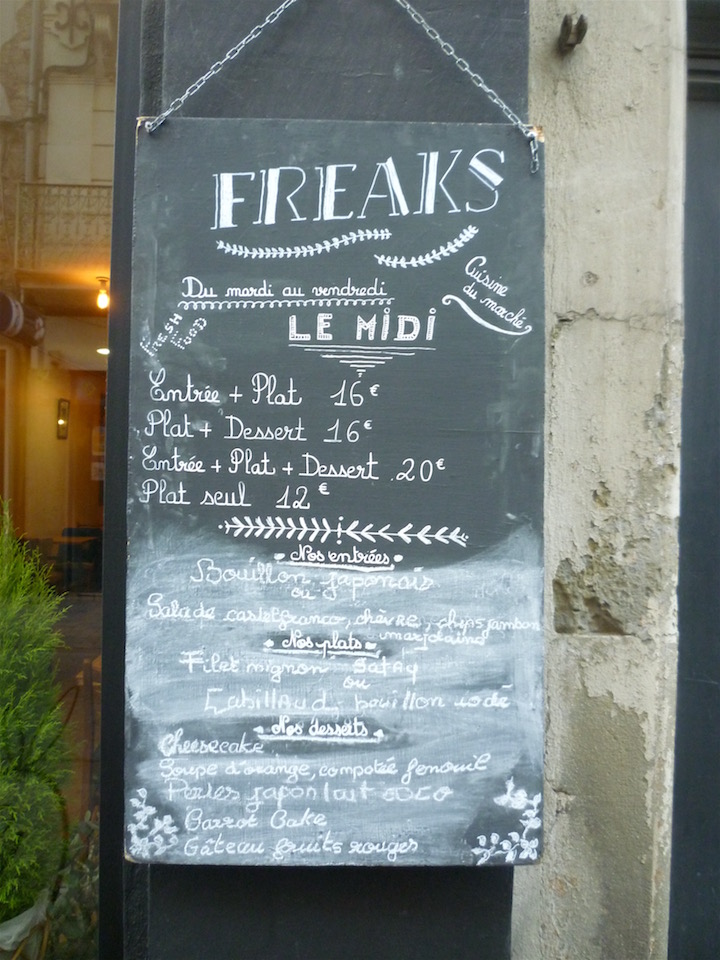
But if your water pitcher is low, it probably will be whisked off the table and refilled without you asking. If you drop your napkin, a new one will appear next to your plate as if by magic. The French waiter is not a participant in your meal but an invisible guardian angel ensuring that your meal goes flawlessly.
This continues right up to the end. Because in France, especially outside big cities like Paris, your table is yours and yours only for the entire evening. You can reserve for 8, but if you show up at 7:45, they won’t say it isn’t ready yet. If you show up at 8:30, you won’t be scolded and then rushed through your meal, because another party is scheduled to take over the table at 10.

Since the French love to linger at the table, there will be a pause between courses. This is expected; the service isn’t slow because the French don’t want their dishes to arrive one right after the other. When diners finish eating, their plates stay on the table until everybody in their party has finished, so that the slow eaters don’t feel pressure to rush. And, if they don’t see anything awry at your table, the waiters won’t come unless called. This is because you have every right to stay at the table and yak with your friends until the restaurant closes, without being pressured to continue to order drinks or coffees or whatever. So when you do want to leave and pay, you have to get their attention. The easiest way is to start to leave; they’ll come quickly with the check.
I have been to restaurants in France with visitors, and they have judged the service as bad, because it didn’t meet their American expectations: the waiter didn’t chat, the waiter ignored the table (though we never needed him), dirty dishes weren’t whisked away upon the last bite, the check took forever to arrive.
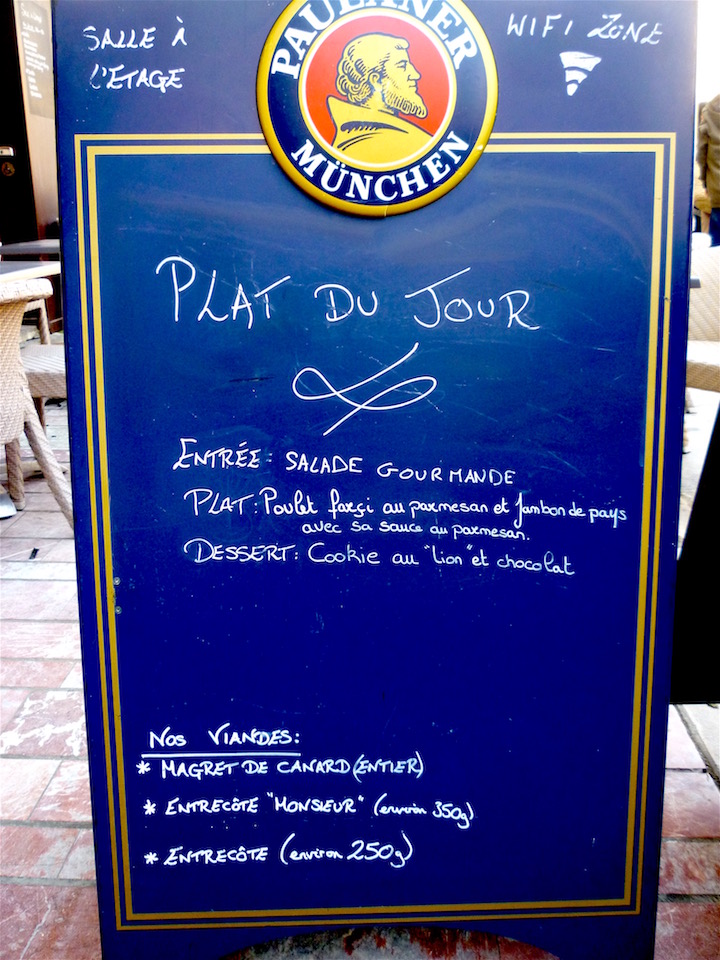 The other thing is if you order something that’s not “done.” Two possibilities might ensue: First, in France and much of Europe, the customer is not always right. Sometimes the customer is sadly mistaken (not the same as wrong). Take the menu above; the last item is veal sweetbreads with a morel cream sauce and risotto. But the waiter might have seen several non-francophone diners confronted with ris when they were expecting riz, having misread the menu. And he might try to see whether you know that ris isn’t rice, even though it’s pronounced exactly the same way as riz. And you might easily take it as the waiter being rude.
The other thing is if you order something that’s not “done.” Two possibilities might ensue: First, in France and much of Europe, the customer is not always right. Sometimes the customer is sadly mistaken (not the same as wrong). Take the menu above; the last item is veal sweetbreads with a morel cream sauce and risotto. But the waiter might have seen several non-francophone diners confronted with ris when they were expecting riz, having misread the menu. And he might try to see whether you know that ris isn’t rice, even though it’s pronounced exactly the same way as riz. And you might easily take it as the waiter being rude.
Or the waiter just can’t comprehend what you want. On a family trip to Italy years ago, my brothers routinely ordered coffee with their meals. Coffee lovers, they couldn’t wait to taste a vaunted Italian venti. The waiters would nod, “sì, sì, signore,” but the coffee wouldn’t come, despite frequent pleas by my brothers. The waiters would reply something in Italian that probably meant “we didn’t forget your coffee.” Eventually, the toddlers in the group had enough of sitting still and we would rush to get the check and leave before tantrums began. And my brothers never got their coffee. Because in Italy, nobody drinks coffee with dinner; it’s for after dessert. (They finally went to a café expressly to have an espresso. “There was a little cup, about the size of a thimble,” one brother recounted. “The bottom of it was barely covered with some brown foam. But I tell, you, it was enough!”)
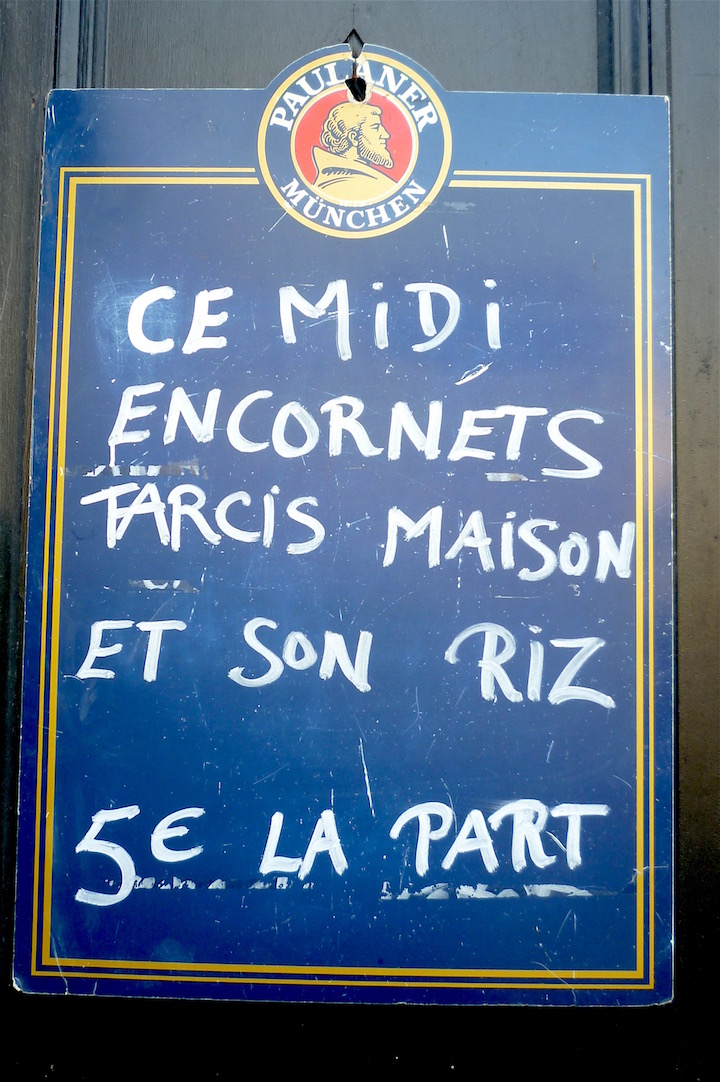 When we lived in New York, the Carnivore suffered grievously every time we went out to eat. It was the same problem of clashing expectations, but in reverse. Why are these waiters telling us their names? Look, here they come again! Can’t they leave us in peace? Why do they bring the main dish so quickly? They don’t give us a minute to breathe! They give us the check before we’ve even had coffee!
When we lived in New York, the Carnivore suffered grievously every time we went out to eat. It was the same problem of clashing expectations, but in reverse. Why are these waiters telling us their names? Look, here they come again! Can’t they leave us in peace? Why do they bring the main dish so quickly? They don’t give us a minute to breathe! They give us the check before we’ve even had coffee!
He would send the main course back and tell them to wait until he had finished with the appetizer (or worse, the aperitif). And he would completely lose it when we would be told we needed to finish up and get out because the next party was waiting for our table. Once, he hadn’t finished the appetizer when the main course arrived, and the waitress grabbed the appetizer plate as he was still stabbing food with his fork. He pointed out that he hadn’t finished, so she just dumped the remaining food onto the main course dish.
But what do you expect? In New York, waiters are actors or singers or some flavor of Future-Successes for whom waiting tables is unworthy of their Greatness. They play the obsequious role only up to a point, then rebel as soon as it looks like they might not get a maximum tip. In France, waiting tables is an honorable métier, paid a living wage (with health coverage and retirement, of course), worth doing for an entire career.
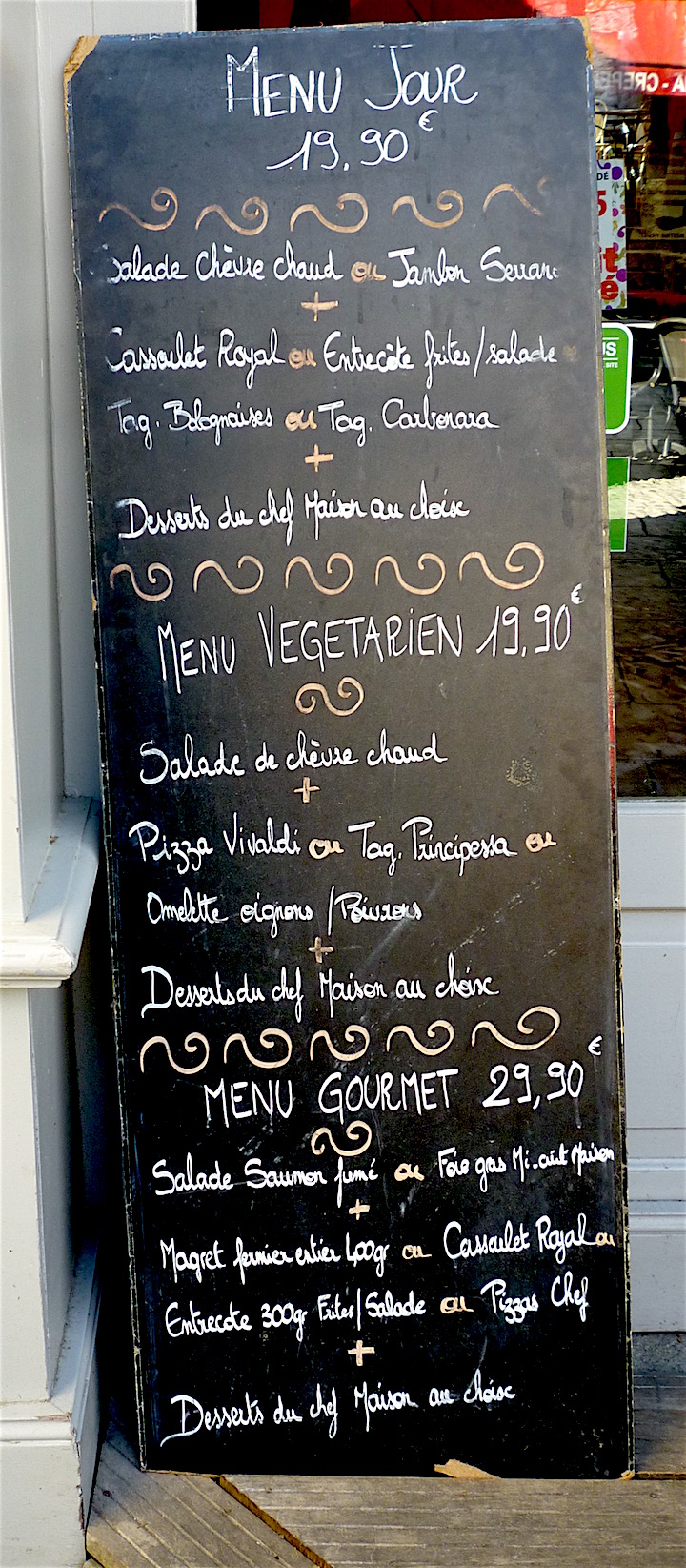 Also, forget about the 20% tips over here. Usually service is included, but one is polite to leave a little extra–10% would be generous.
Also, forget about the 20% tips over here. Usually service is included, but one is polite to leave a little extra–10% would be generous.
So those French waiters aren’t ignoring you. They will know if you drop your fork before it even hits the floor and will slip you a new one before you think to ask. Their job is to work magically, without you noticing. They aren’t being slow or inefficient; they are letting you take your time.
It’s all a matter of perspective. Bon appétit!

Brilliant tip: if it’s a pre-printed menu it might not focus on local/seasonal. Thank for that. Great information!
LikeLiked by 2 people
Well, it doesn’t take much to print out a bunch of menus, but if they went to the trouble of fancy typefaces and laminating, that could indicate that they intend to use the menu for a while.
LikeLike
Yes the menu in every langauge under the sun is a sure sign!
LikeLiked by 2 people
It sure indicates they are aiming for tourists. But these days getting something like a menu translated isn’t hard, so even a tiny resto can do it.
LikeLiked by 1 person
I got Korean food at a place in what we could maybe call the Flushing of Philly that didn’t have an English menu. Ordering was a shot in the dark but it was good.
LikeLiked by 1 person
If you’re adventurous/not squeamish, you probably can’t go wrong. I’ve no doubt it’s all delicious.
LikeLike
Now I wonder what the Carnivore would say about the service I’ve gotten at times in Chinatown though. Once I went into a place with a big group of friends. They had one table that would accommodate us that was occupied by a party of 2, so they had those 2 people get up and move to a different table halfway through their dinner
LikeLiked by 1 person
Sometimes you wonder…
LikeLike
I’m glad that my one trip to France included French hosts who chose the restaurants and helped us with the menus. It was all good, but the best meal was at our host’s home.
LikeLiked by 2 people
Ah, a home-cooked meal is a special pleasure. But the kinds of food you have at home and in a restaurant are usually pretty different. I still dream about a charlotte aux legumes that I ate at a restaurant in Dijon 20 years ago, and other dishes since.
LikeLike
Excellent tips. I just got back from there and found the waiters rather professional and more importantly sincere!
LikeLiked by 1 person
I’m glad you had good experiences!
LikeLiked by 1 person
I did a summer exchange in Paris and the Ardeche in ’08 and my parents came while I was there. We stopped for lunch on the road and some unfancy restaurant that was very good, and there was coffee included with our lunches. I asked them to bring my mom a tea and bring my dad the other 3 coffees. They laughed at us, but in a very friendly way. I’ve also found waiters to be very kind if I’d ask them questions like, “C’est quoi le magret?”
LikeLiked by 2 people
Great story. Coffee with milk is considered breakfast food; later in the day (like after dinner), coffee is served without milk. They will raise an eyebrow if you ask for it–it’s like asking for a side of Cheerios–but they will do it.
LikeLiked by 1 person
I wonder what they’d say about the Irishman’s taste in coffee then. My dad took it black; he likes it with milk and sugar or with neither.
Sorta related in my mind, the French applied French rules to my last name. I told them that it is possible to pronounce it the way I said it’s pronounced because it’s not a French name, and that it is possible to spell it with a prefix and a capital letter in the middle, without a space, and due to a spelling error at immigration probably because my ancestors couldn’t read. They told me that as I’m not an aristocrat, my name is illegal. I told them that any regulation of titles is against the Constitution of the United States and that therefore no one can force me to change it.
LikeLiked by 1 person
Some arguments can’t be won.
LikeLike
but they can still be laughed at
LikeLiked by 1 person
What an excellent post chock-full of top tips for the uninitiated…. I could have done with the reverse guidance when I started my year in New England …. it might have prevented me from being quite so anxious in the early stages – all that familiarity and speed was terribly unnerving fresh off the boat from France 😁
LikeLiked by 1 person
And American waiters will dial up the attention if you seem cold, because they fear they won’t get a tip.
LikeLiked by 1 person
Fortunately, the more nervous I am, the more I talk so I got off lightly on the ratcheting up of friendliness … And equally fortunately I did understand the importance of tips to servers and kitchen staff (was quite horrified by how poorly paid most are sans gratuities, actually …)
LikeLiked by 1 person
After many trips to France I still have never ordered a salad. The thing is, I am absolutely phobic regarding vinegar! Would it be terribly rude to ask for a salad, “with just oil”? Too fussy/demanding??
I really enjoyed this post…and vicariously reading all of the menus!
LikeLike
Sure you can. If they have vinaigrette, just ask for some olive oil. I find that red wine vinegar–what tends to go on salads–isn’t too strong.
LikeLike
We have found that if none of the patrons of a restaurant know each other…it is sure to be a tourist haunt. Also if one is to have the full…FRENCH….experience, eat at a later hour and watch the theatre of the evening unfold. I think lunch is even a better choice for the….FRENCH …experience. The variety of the clientele for people watching is fantastic….and the food is usual in a catogory of its own.
Great article.
Ali
LikeLiked by 1 person
YES! At lunch you often get groups of co-workers.
LikeLike
Once we could not understand the board or the waiter/owner….he took us to the kitchen and pointed to the food. That showed his willingness to accommodate us. We have never had a so called rude waiter.
Ali
LikeLiked by 1 person
That is just wonderful!
LikeLike
Thank goodness for non-chatty waiters. It’s one of the things I most dislike about American restaurants and a reason I avoid eating out. And, as Osyth said, being horrified at how poorly paid they are.
Great tips on menu-reading, thanks.
LikeLiked by 1 person
They can be talkative if you engage them. But it’s your choice.
LikeLike
Great post as always. We are coming to France (Arles/Nimes area)in September and I have been noting your restaurant recommendations! Never had a problem with rude waiters – they always seem so patient with my speaking French (Luckily for me my husband is French speaking)
LikeLiked by 1 person
I never find them to be rude either, but they have that reputation. I think it’s mostly crossed wires.
LikeLike
fun post! Good tip to look for chalk boards. There were none in Mont St Michel of course. The bill almost never comes unless you are in a cafe. You must ask for it. You could be there all night waiting if you didn’t know. FYI: You can go to jail if you can’t pay. Doing dishes is not an option in France.
LikeLiked by 1 person
I didn’t know that about jail. It IS like stealing.
LikeLike
Great tips for folks who are not accustomed to the way things are in another environment.
LikeLiked by 1 person
It’s the whole point of travel, right? Opening our minds.
LikeLike
These are such great ideas! I love the idea of looking for the chalk menus!
LikeLiked by 1 person
The blackboard is where you’ll find the day’s specials, if not the entire menu.
LikeLike
One of the very worst (and fairly recent) things about dining in the U.S. is the waiter identifying himself by his first name and being chummy. Can’t stand it!!! And then, to stop back at least 3-4 times to see if everything is “ok”. No No No. Just leave me alone! I love the French style at restaurants and will always miss it here!
LikeLiked by 1 person
Yes, it’s good when they are paying attention if you wave at them, but otherwise, peace is preferred.
LikeLike
Aaargh! Nothing annoys me more when eating in the US than when the waitress introduces herself and interrupts the conversation several times, to check if she can get us anything else. Unfortunately this is now happening a lot in the UK. Even worse is when plates are snatched away before everyone has finished eating. Rude.
In France they do it right. I’ve always been served by polite and helpful waiters. (OK, so one guy on Ile de Ré did answer in English when I spoke in French but he could have been trying to be helpful.) I try to opt for the specials board here in the UK as well as in France, it usually means the produce is seasonal …and fresh.
LikeLiked by 1 person
I remember a friend practicing and practicing his order in French at Quick (like McDonald’s), managing to say it to the teen manning the cash register, only to have her reply in perfect English. Devastating!
LikeLike
Very good tips to keep in mind, particularly about places with chalkboards. I’m able to get the essence of what’s written down, enough so that I wouldn’t be ordering seafood, though some of the chalkboard signs did have challenging looking handwriting!
LikeLike
One day I will do French cursive writing, which is not at all the Palmer method that I learned.
LikeLike
I love this post – I hope you will allow me to re-post it on my blog? There’s one restaurant not far from Saint-Chinian, where the menu hasn’t really changed in over 20 years (some people say for three generations), but the food is always very good, and locals love it for Sunday lunches! When I first went there, the pate came in a great big bowl, but they’ve had to give that up, perhaps for hygiene reasons? You’re spot on about the small menus, the places where the choice is large and varied are the ones where a lot of it is delivered by the likes of Brake France, a very big catering supplier. My only gripe with most French restaurants, is that they don’t take enough care with their desserts. So many of them buy them in or use packet mixes, when they could so easily prepare something (preferably off the beaten path) delicious and seasonal from scratch…
LikeLiked by 1 person
Yes, you may repost.
There was a resto here that had a big cart of charcuterie–they wheeled it over and you could help yourself to as much as you wanted as an entrée. The last time we went that was gone; probably hygiene, as you say, probably after the last big flu outbreak.
Usually the places with a real chef (not just cooks) have amazing desserts. If you go by a place a lunch time, you can peak at what people are having and then decide whether you want to come back for dinner.
LikeLike
Reblogged this on midihideaways and commented:
I came across this post on francetaste, and I hope that you find it as interesting as I did!
LikeLike
We visit France every year for our hols. I love French restaurants, bistros, cafes. The waiters are always so professional and helpful. Have never had a rude one. But then I do speak a reasonable amount of French and always greet them politely first before ordering or asking about the menu. We often go back to some of our favourites each year and they remember us. Last year at one fave quite famous place we were even brought complimentary glasses of champagne and welcomed back. A couple of years ago our son and DIL and their two girls joined us in Paris and we had a ball. The girls were 10 and 8 at the time and spoke a little French (learned at school) and are very well mannered. They were treated beautifully always by waiters when they joined us for lunch.
Once saw a French mother and her little girl taking the gouter at Carette in the Place des Vosges. They’d been shopping at the June sales and had heaps of designer bags. Suddenly the little girl had to be taken to the toilet downstairs. The mother left all her bags at the table having asked a waiter to keep an eye on them. He stood guard till she returned. I was so impressed. Best wishes, Pamela
LikeLiked by 1 person
I love your tales! And I’m not surprised the waiter played guardian angel.
LikeLike